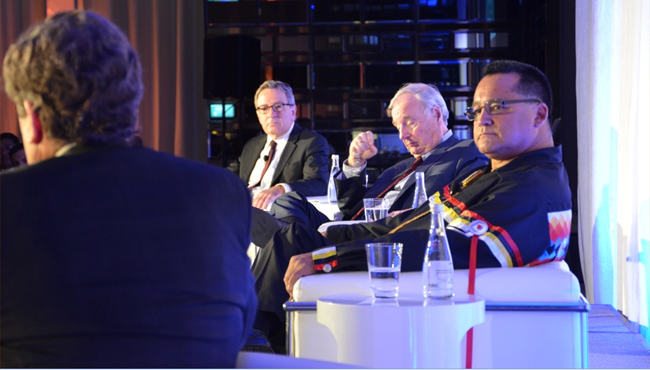Creating Partnerships evening links business with First Nations

By Peter Gorrie
TORONTO – The audience roared as Patrick Madahbee, Grand Chief of the Anishinabek Nation, described an incident on Manitoulin Island:
A cruise ship arrived, met by a Mountie in red serge. The tour guide suggested it would be appropriate for a chief in full regalia to welcome the boat.
No, Madahbee replied: “We’ll only make that mistake once.”
Funny, but serious, too, for the more than 200 business and First Nations people at the inaugural Anishinabek Nation 7th Generation Charity “Creating Partnerships Evening presented by RBC.”
The tour guide didn’t ask Madahbee or the community how they’d greet the visitors, which could have led to them creating and managing a meaningful experience of First Nations life and culture.
It’s a small but memorable example of the top-down approach that’s undermined us for 150 years, the Grand Chief said. “We’ve got to stop repeating the same ways of how we do business.”
Madahbee spoke during a panel discussion at the Oct. 17th partnership evening, in Toronto’s glittering new Four Seasons Hotel. The event was the first of what’s to be a major annual fund-raiser for the Charity, which since 1999 has raised $600,000 for scholarships and bursaries and to support education, health care and other under-funded services in the 39 Anishinabek communities.
The evening will promote partnerships among First Nations, the federal and provincial governments, and business to generate opportunities, particularly for young people, who comprise 40 per cent of Canada’s aboriginal population.
Indicating Ontario’s strong interest, Premier Kathleen Wynne attended a reception before the gala dinner.
The panel included former Prime Minister Paul Martin, Ontario’s Minister of Aboriginal Affairs, David Zimmer and the emcee, broadcaster and former Ontario Conservative Leader John Tory: All acknowledged First Nations’ right to the resources and autonomy needed to develop their communities and forge true partnerships.
That means ending the paternalism enshrined in Canada’s 1876 Indian Act — to Martin, “probably the worst piece of legislation drafted by any government anywhere” — and tight-fisted federal funding that, for example, gives reserve schools only half as much per student as those financed by Ontario. It also requires governments and industry to deal with First Nations as equals.
First Nations support development but only with community control and benefits, Madahbee said. “We have to empower our people … to take control of our lives” and “put in place our way of thinking, our world view. We don’t need somebody dictating what we can do and cannot do. … We know how to do the job.”
Non-aboriginals must acknowledge: “You know what works and what doesn’t. Here are some resources; you run with it,” Zimmer said.
Key issues involve untangling jurisdiction, increasing awareness and understanding between aboriginal and non-aboriginal people, and improving First Nations education, panellists agreed.
Training is crucial. While Canada looks abroad for skilled workers, First Nations youth could fill the labour shortage.
“Surely we should be able to find a way to give that talented pool first dibs on the jobs we’re trying to fill in Canada,” Zimmer said.
“The single most important issue to face Canada is First Nations poverty and how to eradicate this plague,” said keynote speaker Phil Fontaine, former Grand Chief of the Assembly of First Nations. “We have to move quickly and … persuasively. Partnerships are our best option to create a better future for Canada and aboriginal people.”

